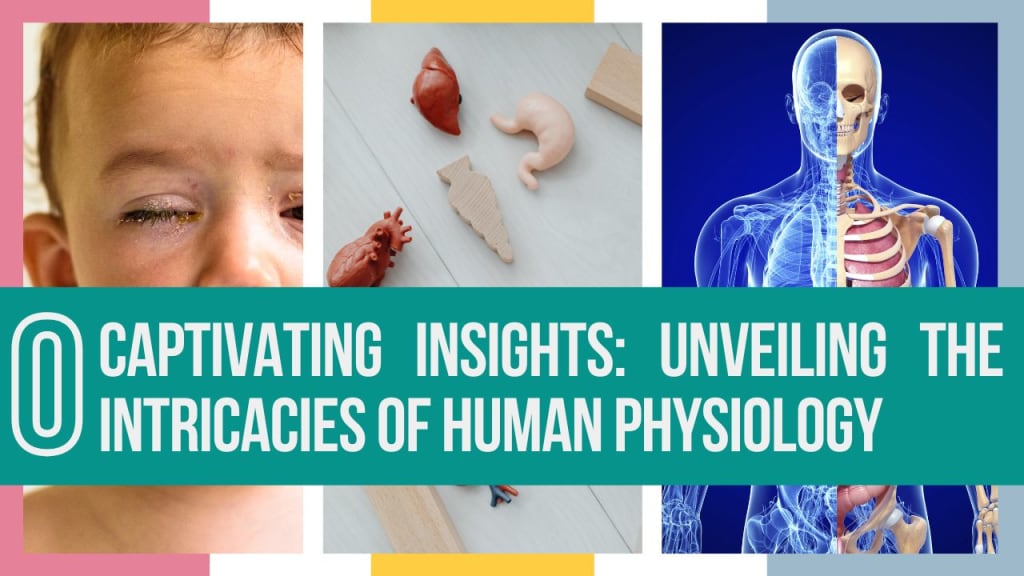Content warning
This story may contain sensitive material or discuss topics that some readers may find distressing. Reader discretion is advised. The views and opinions expressed in this story are those of the author and do not necessarily reflect the official policy or position of Vocal.
Insights into Human Physiology: Unveiling the Intricacies of the Body and Beyond
Exploring the Marvels of Human Anatomy, Function, and Perception

Clinical and Logical Insights: Exploring the Wonders of the Human Body
The human body, a marvel of intricate design and astonishing capabilities, never ceases to amaze us with its remarkable features and functions. In this exploration of clinical and logical insights, we delve into the fascinating aspects that make the human body a true masterpiece of nature.
One of the most intriguing facts about our circulatory system is the incredible length of our veins. If stretched out, they could circumnavigate the Earth's equator multiple times, emphasizing the sheer extent of this intricate network that delivers essential nutrients and oxygen throughout our bodies. Furthermore, the human heart, with its remarkable pacemaker, can continue to beat autonomously outside the body for as long as oxygen is available, showcasing its resilience and adaptability.
While the lungs are vital organs responsible for oxygenating our blood, their size is influenced by the positioning of the heart. This unique relationship between these organs highlights the intricate balance that exists within our body's internal architecture. Another astonishing comparison lies in the hardness of human teeth, which matches that of shark teeth, demonstrating the resilience and strength of this often-overlooked aspect of our anatomy.
The cornea, a transparent layer covering the front of the eye, stands as a testament to the body's exceptional adaptability. Unlike other body parts, the cornea receives oxygen directly from the air rather than relying on blood circulation. This remarkable feature showcases the body's ability to optimize its functions to suit specific needs.
Gender differences also play a role in the intriguing facts about our bodies. Women's hearts, for instance, tend to beat faster than men's while at rest, highlighting the intricate interplay between physiological factors and gender. Interestingly, teeth, which play a crucial role in our daily lives, are the only part of the body incapable of self-healing, emphasizing the importance of dental care and maintenance.
Delving further, we encounter additional insights that shed light on the uniqueness of the human body. The ovum, or egg cell, holds the distinction of being the largest cell in the human body, underscoring its pivotal role in reproduction. Teratomas, or dermoid cysts, take uniqueness to another level by containing various tissues, hair, muscles, and even teeth, showcasing the body's capacity for surprising variations.
As we shift our focus to the impact of extra faculties on our perception, we uncover a world beyond the traditional five senses. Proprioception, responsible for body awareness, contributes to our sense of movement and spatial orientation. This sense allows us to navigate our surroundings with precision and accuracy, showcasing the body's ability to perceive its position in space.
Additionally, the sense of balance, known as equilibrium, plays a crucial role in maintaining stability and coordination. This intricate system enables us to maintain an upright posture and move gracefully, emphasizing the body's harmonious interplay of sensory functions. Thermoreception, responsible for detecting temperature changes, further enhances our sensory experience by allowing us to gauge our environmental comfort and respond accordingly.
Nociception, or the ability to sense pain, serves as a protective mechanism, alerting us to potential threats and triggering defensive responses. This essential sense plays a pivotal role in ensuring our safety and well-being, underscoring the body's intricate system of self-preservation.
Lastly, chronoception, or time perception, adds another layer to our sensory experience. This sense enables us to assess the passage of time and organize our activities, contributing to our daily routines and schedules. The intricate interplay of these sensory faculties shapes our understanding of the world around us, enriching our experiences and interactions.
In summary, the human body stands as a testament to the wonders of nature, with its intricate design, astonishing capabilities, and multifaceted sensory system. By delving into these clinical and logical insights, we gain a deeper appreciation for the complexities that define our existence. As we continue to unravel the mysteries of our bodies, we are reminded of the limitless potential and adaptability that characterize the human experience.
About the Creator
VisionQuester
Passionate learner, explorer & communicator. Positive thinker, eager to inspire & connect through shared experiences.
Enjoyed the story? Support the Creator.
Subscribe for free to receive all their stories in your feed. You could also pledge your support or give them a one-off tip, letting them know you appreciate their work.






Comments (1)
Actually their is a study on reversing tooth decay. God certainly made our body amazing and awesome